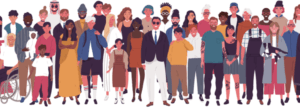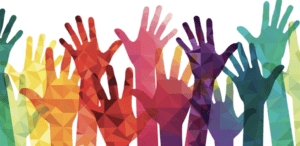No One Gets This Done Perfectly ~
Reflections on the Connection between Leadership and Diversity, Equity, and Inclusion.
I am seizing the moment to write a quick blog post to share a connection today between the Cohort21 strands and some thinking that was generated by an amazing PD Session yesterday from Michel Shah.
During the pandemic, I have been functioning on a basis of addressing the recurring question, “what’s my next, most urgent issue?”. The bandwidth is stretched, but my curious questions carry on and my mind races to think of how the pandemic has thrown a grenade in the center of everything. I don’t think about returning to normal, I think about building back better. Addressing the needs that exist, by putting the pieces back differently and discarding many all together. It’s time to say goodbye to nostalgia and embrace the needed change of the future.
These days come at an accelerated pace and with many tensions. There is a push and pull between conflicting priorities, pressing issues, and trying to stay grounded. Moments of time can stand still and many more feel like I’m sprinting to catch up. It’s much more about the mental running now than physical, but I get enjoyment from systems thinking and visualizing, imagining, and brainstorming how to best address the needs of our future-driven learners. The pandemic has asked us to consider how we do things. Change feels like the only constant and it’s all so much at once. In the midst of all of this, I am trying to be present and focus on my connections and relationships just to get me through. I feel supported and grateful for it, and I pause to think about being without that feeling of inclusion and belonging that school provides.
In Season 9 of Cohort21 this year, I have opted to focus on Leading Through Crisis. Today, in a Diversity, Equity, and Inclusion workshop I was participating in (as part of a committee I recently joined), I realized how critical these concepts are for us to understand and embrace. I could see the interconnectivity of everything. I thought about how the pandemic has opened the doors for systems thinking and that we need, more now than ever, to develop our schools as learner-centered. These learners need to be every single person who is a part of each and every community. In order to make effective change, we need to be progressive and responsive where all members of a school are both teachers and learners. So, I ask, how might we show up as leaders and change the system?
When thinking about diversity, equity, and inclusion it’s hard to know where to start. The systemic issues are deep and fraught with conflict and heightened emotion when emotional fragility is at an all-time high. I ask myself if I am qualified to be discussing this, and then I think, everyone needs to be discussing this issue. It just feels so complex and the intensity of getting it right is pressing.
So, what do you do when you need to start and the problem you are addressing looks way too big? The advice from Michel Shah today was, take it one bite at a time. While thinking of diversity, equity, and inclusion, and the change that is needed, she suggested that we make sure to take small bites, so that we can spit them out, rather than choke. Most importantly, in taking the bite, you are taking action. By avoiding choking on something too big, you succeed by keeping the momentum going with small progress that leads to positive outcomes and necessary change.
She reminded us that we should:
- Start from within and build awareness
- Work to tear down silos
- Change the questions to change the narrative and come to different solutions
- Question our subconscious
- Be ready, willing, and open to change
- Approach students and teachers as learners – side-by-side
Also, that,
- No One Gets This Done Perfectly ~ you just need to start.
During the conversation, she asked us to consider the qualities of an ethical leader? She reminded us that values are not something you state, it’s something you demonstrate.
To speak of leadership frameworks in schools, we must first understand DEI and put people at the center. We must build the awareness, capacity, and co mpetency of everyone, regardless of titles of positional leadership. To bring all voices to the table means to exist as a learner at all times in the system.
mpetency of everyone, regardless of titles of positional leadership. To bring all voices to the table means to exist as a learner at all times in the system.
If we value establishing ethical, diverse, and inclusive schools we must demonstrate that each and every day, by being conscious of our own power and spheres of influence.
How do we demonstrate the tenants of diversity in our schools and work to develop a common language? How do we dig deeper into our awareness of our actions, impact, and implicit bias? What’s that first bite?

Hi Sam, this is such a great post! In thinking about DEI in my own classroom, I have also felt overwhelmed with where to start. Trying to engage students in DEI conversation, led to enough awkward moments that I knew I really had some hard work to do. Thank you for reminding me that I don’t have to feel I’ve got it all figured out to start.
I also found this episode from Cult of Pedagogy to be so helpful (https://www.cultofpedagogy.com/diversity-strategies/). Hedreich Nichols provides 9 practical strategies for building inclusivity in the classroom.
Wonderful Sam! I am right here on this page with you asking “what is the first bite”. My gut tells me that your draw to “trying to be present and focus on my connections and relationships” is that bite. This is where I am at anyway… listening to learn. I know you’re in the ‘Leading during crisis’ group, but I hope you’ll keep posting about your thoughts on DEI. You raise some great questions here!
This is a wonderful post, Sam. I think it is such great advice for all aspects of life – “no one gets this done perfectly” and ” to take small bites”
Such incredible work to be done and so important. Thank you for joining that committee and bringing your kind and respectful voice to the conversation. I look forward to hearing more about your experience. My husband and I watched this Ted Talk, which is called “The Lie that invented Racism” – it was a good quick watch and did just what you were mentioning – changing the questions to change the narrative. https://www.youtube.com/watch?v=oIZDtqWX6Fk